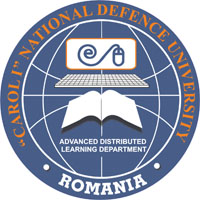CASE STUDY ON CONSTRUCTIVIST LEARNING USING GOOGLE APPS AT UNIVERSITY OF BUCHAREST ODL DEPARTMENT CREDIS
CASE STUDY ON CONSTRUCTIVIST LEARNING USING GOOGLE APPS AT UNIVERSITY OF BUCHAREST ODL DEPARTMENT CREDIS
Author(s): Beatrice Hellen Almăşan, Mariana Mirela ILIESubject(s): Education
Published by: Carol I National Defence University Publishing House
Keywords: technology of education; distance learning; blended-learning; digital technology; constructivist theory of learning; Google Apps; course design
Summary/Abstract: Over the last decade the technology of education has gained an important place in the educational process. To enhance this reality, international organizations have stated the need to use information technology and digital technology in the process of teaching, learning, assessment and evaluation. The most important international organizations which make recommendations and elaborate guidelines are UNESCO and European Commission. Considering these recommendations to use digital technology in education corroborated with the need of students to use it in their educational process, to collaborate, to work in teams, to contribute to their learning, the Faculty of Psychology and Sciences of Education of University of Bucharest within master programme ICT in Education and the Distance Learning department of University of Bucharest within its master programmes have courses designed mostly to enhance the use of digital technology in educational process. Therefore, the aim of the present research is to present a case of good practices in which the constructivist approach of learning is supported by technology using Google Apps like Google Drive, Google Docs, and Google Slides. The case study is focused on the idea that learning is possible through dual factors: social interaction and simultaneous exposure to cognitive experiences in which peer and collaborative learning is central and the teacher is also mediator, moderator and facilitator of learning supporting students to developdigital competencies, positive attitudes of self-esteem and empathyand cognitive abilities. The overarching outcome will be a coherent image of a master course designed to enhance ideas with technology based on a constructivist approach.
Journal: Conference proceedings of »eLearning and Software for Education« (eLSE)
- Issue Year: 11/2015
- Issue No: 02
- Page Range: 512-517
- Page Count: 6

